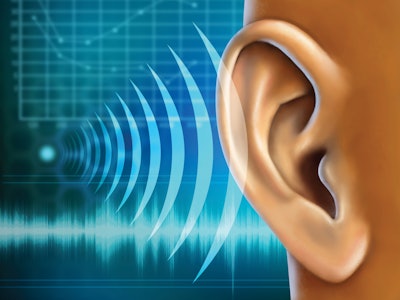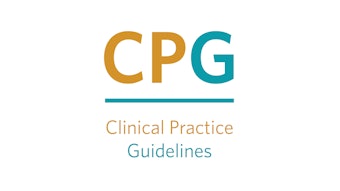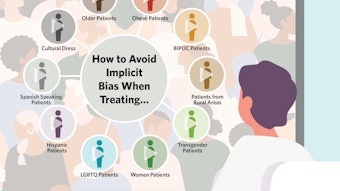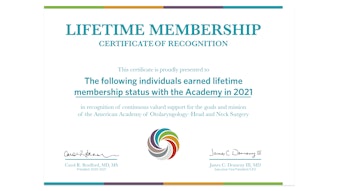From the Education Committees | Hearing Loss and Cognitive Decline: What Does the Data Say?
Evidence published during the past decade has established an undeniable link between hearing loss and cognitive decline.
Maura Cosetti, MD, Chair-elect, Otology and Neurotology Education Committee

In some of the first, large-scale epidemiologic studies on this topic, Lin et al. and others found that hearing loss was independently associated with a 40% rate of accelerated cognitive decline.2-4 Prospective cohort data with > 10 years of follow-up demonstrated a linear relationship between severity of hearing loss and dementia risk: Individuals with mild, moderate and severe hearing loss had a two-, three-, and fivefold increased risk of dementia compared to those with normal hearing.3 Data suggests that even subclinical hearing loss may pose a risk for cognitive impairment.5 Multiple subsequent meta-analyses have supported these conclusions.6,7 Loughrey et al. analyzed published data from 20,264 unique participants across 12 countries and reinforced age-related hearing loss (ARHL) as a risk factor for cognitive impairment and dementia.6
Results from these population-based cohort studies are compelling both because of the size of the data sets and the consistency of the association across diverse populations. These high-quality epidemiologic investigations used regression modeling to control for confounding variables and covariates (most notably age, cardiovascular disease, and socioeconomic status) and found the strength of the association between hearing loss and cognitive impairment was still significant.2-4
Importantly, however, association does not imply causation, and a number of models have been proposed to explain the possible directions of this association. One hypothesis is that the relationship between hearing loss and cognitive impairment is mediated by reduced socialization, a well-established sequelae of hearing loss. Social isolation and related socio-emotional states such as loneliness and depression are known to have a powerful and profound effects on dementia risk. Another proposed theory cites changes in brain structure and function caused by or resulting from ARHL. Emerging neuroimaging data support a possible neuroanatomical link between hearing loss and dementia, including atrophy of the auditory cortex and frontotemporal regions and increased presence of β-amyloid.8-10 Finally, the concept of cognitive load and effortful listening may explain or mediate the relationship between hearing loss and dementia. Research suggests that the additional attentional effort required to understand speech in the setting of hearing loss may lead to decreased cognitive reserve and subsequent impairment.11
Though it remains unclear which of these mechanisms, independently or in concert, may explain this complex relationship, the potential implications have garnered substantial attention worldwide. Available data were so compelling that the Lancet cited hearing loss as the single most modifiable risk factor for dementia, larger than smoking, diabetes, and education.12
As hearing healthcare providers, we routinely witness the undeniable benefit of treating hearing loss, but is there evidence that treatment of hearing loss (either with hearing aids or cochlear implants) can diminish, slow, or prevent cognitive decline?
At present, data to answer this question are limited. Studies show hearing aids improve rates of loneliness and depression among users.13,14 Comparisons between groups of hearing aid users to nonusers suggested lower rates of dementia in hearing aid users. Here again, however, an appreciation of confounding variables is needed to interpret these results. On average, hearing aid wearers have higher socioeconomic status, higher education, and have greater access to and utilization of healthcare—all factors that have been shown to protect against dementia. An inability to disentangle these confounders requires a nuanced interpretation of the data.
Limited available results from few randomized controlled trials (RCT) have been promising. Brewster et al. monitored improvement in depression scores and memory for adults with depression and ARHL treated with either a hearing aid or a sham aid (10 dB gain) for 12 weeks. Improvements in memory and cognition were seen in the appropriately amplified group, though blinding was incomplete.15 Results of an ongoing, large RCT examining the efficacy of hearing aids compared with aging health education on cognition in adults with ARHL (Aging and Cognitive Health Evaluation in Elders, or ACHIEVE) began in 2017 and will hopefully provide long-awaited insight into the effects of hearing rehabilitation.16
Cognitive decline is one of many recently identified and diverse health-related risks of hearing loss, including falls, morbidity, and overall longevity. It is estimated that interventions delaying the onset of dementia by even one year could decrease the worldwide prevalence of dementia by 10%.7 Increasing evidence for the individual and public health burden of untreated hearing loss should encourage us to educate our patients about these risks and the potential benefits of intervention.
References
1. World Health Organization. World report on hearing. 2021.
2. Lin FR, Yaffe K, Xia J, et al. Hearing loss and cognitive decline in older adults. JAMA Intern Med. 2013;173(4):293-299. doi: 10.1001/jamainternmed.2013.1868. PMID: 23337978; PMCID: PMC3869227
3. Lin FR, Metter EJ, O'Brien RJ, Resnick SM, Zonderman AB, Ferrucci L. Hearing loss and incident dementia. Arch Neurol. 2011;68(2):214-220. doi: 10.1001/archneurol.2010.362. PMID: 21320988; PMCID: PMC3277836
4. Gurgel RK, Ward PD, Schwartz S, Norton MC, Foster NL, Tschanz JT. Relationship of hearing loss and dementia: a prospective, population-based study. Otol Neurotol. 2014;35(5):775-781. doi: 10.1097/MAO.0000000000000313
5. Golub JS, Brickman AM, Ciarleglio AJ, Schupf N, Luchsinger JA. Association of subclinical hearing loss with cognitive performance. JAMA Otolaryngol Head Neck Surg. 2020;146(1):57-67. doi: 10.1001/jamaoto.2019.3375
6. Loughrey DG, Kelly ME, Kelley GA, Brennan S, Lawlor BA. Association of age-related hearing loss with cognitive function, cognitive impairment, and dementia: a systematic review and meta-analysis. JAMA Otolaryngol Head Neck Surg. 2018;144(2):115-126. doi: 10.1001/jamaoto.2017.2513. Erratum in: JAMA Otolaryngol Head Neck Surg. 2018;144(2):176.
7. Thomson RS, Auduong P, Miller AT, Gurgel RK. Hearing loss as a risk factor for dementia: a systematic review. Laryngoscope Investig Otolaryngol. 2017;2(2):69-79. doi: 10.1002/lio2.65
8. Lin FR, Ferrucci L, An Y, et al. Association of hearing impairment with brain volume changes in older adults. Neuroimage. 2014;90:84-92. doi: 10.1016/j.neuroimage.2013.12.059
9. Armstrong NM, An Y, Doshi J, et al. Association of midlife hearing impairment with late-life temporal lobe volume loss. JAMA Otolaryngol Head Neck Surg. 2019;145(9):794-802. doi: 10.1001/jamaoto.2019.1610
10. Golub JS, Sharma RK, Rippon BQ, Brickman AM, Luchsinger JA. The association between early age-related hearing loss and brain β-amyloid. Laryngoscope. 2021;131(3):633-638. doi: 10.1002/lary.28859
11. Peelle JE, Wingfield A. The neural consequences of age-related hearing loss. Trends Neurosci. 2016;39(7):486-497. doi: 10.1016/j.tins.2016.05.001
12. Livingston G, Sommerlad A, Orgeta V, et al. Dementia prevention, intervention, and care. Lancet. 2017;390:2673–2734.
13. Contrera KJ, Sung YK, Betz J, et al. Change in loneliness after intervention with cochlear implants or hearing aids. Laryngoscope 2017;127(8):1885-1889.
14. Choi JS, Betz J, Li L, et al. Association of using hearing aids or cochlear implants with changes in depressive symptoms in older adults. JAMA Otolaryngol Head Neck Surg 2016; 142:652-657.
15. Brewster KK, Pavlicova M, Stein A, et al. A pilot randomized controlled trial of hearing aids to improve mood and cognition in older adults. Int J Geriatr Psychiatry. 2020;35(8):842-850. doi: 10.1002/gps.5311
16. Deal JA, Albert MS, Arnold M, et al. A randomized feasibility pilot trial of hearing treatment for reducing cognitive decline: results from the Aging and Cognitive Health Evaluation in Elders pilot study. Alzheimers Dement 2. 2017;3(3):410-415.




















